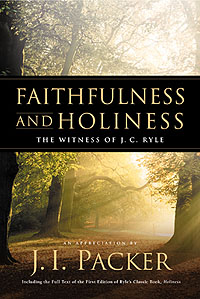 Holiness by J.C. Ryle was the first book I read devoted to the believer’s personal holiness. Through the years I’ve returned to it many times for instruction and encouragement, and it remains atop my list of recommended books on the subject.
Holiness by J.C. Ryle was the first book I read devoted to the believer’s personal holiness. Through the years I’ve returned to it many times for instruction and encouragement, and it remains atop my list of recommended books on the subject.
Ryle loved the the gospel of God’s justifying grace in Christ. “For by grace you have been saved through faith. And this is not your own doing; it is the gift of God, not a result of works, so that no one may boast” (Ephesians 2:8-9). Not human works but Christ, by his meritorious life and atoning death, saves believing, repentant sinners.
God justifies, and he also sanctifies as he works in believers to purify and make them holy in heart, mind, and conduct. So, sanctification is a grace.
But sanctification is also our duty. We must “strive for peace with everyone, and for the holiness without which no one will see the Lord” (Hebrews 12:14).
Sanctification as both grace and duty is found in passages like these:
“For the grace of God has appeared, bringing salvation for all people, training us to renounce ungodliness and worldly passions, and to live self-controlled, upright, and godly lives in the present age” (Titus 2:11-12).
“But by the grace of God I am what I am, and his grace toward me was not in vain. On the contrary, I worked harder than any of them, though it was not I, but the grace of God that is with me.” (1 Corinthians 15:10)
In sanctification we cooperate with God’s Holy Spirit and use the scriptural means God has appointed to advance our holiness. Bishop Ryle observes:
Sanctification . . . is a thing which depends greatly on the use of Scriptural means. When I speak of “means,” I have in view Bible-reading, private prayer, regular attendance on public worship, regular hearing of God’s Word, and regular reception of the Lord’s Supper. I lay it down as a simple matter of fact, that no one who is careless about such things must ever expect to make much progress in sanctification. I can find no record of any eminent saint who ever neglected them. They are appointed channels through which the Holy Spirit conveys fresh supplies of grace to the soul, and strengthens the work which He has begun in the inward man. Let man call this legal doctrine if they please, but I will never shrink from declaring my belief that there are “no spiritual gains without pains.” I should as soon expect a farmer to prosper in business who contented himself with sowing his fields and never looking at them till harvest, as expect a believer to attain much holiness who was not diligent about his Bible-reading, his prayers, and the use of his Sundays. Our God is a God who works by means, and He will never bless the soul of that man who pretends to be so high and spiritual that he can get on without them.
– J.C. Ryle in J.I. Packer’s Faithfulness and Holiness: The Witness of J.C. Ryle (Crossway, 2002), 124-125. The book includes an appreciation by J.I. Packer and the full text of the first edition of Ryle’s Holiness, published in 1877).
Our sanctification is progressive, often unsteady, never complete in this life. But, secure in our Savior, our victory is certain. As we apply ourselves to scriptural means we “fight the good fight of the faith” and “take hold of the eternal life” to which we were called (1 Timothy 6:12).